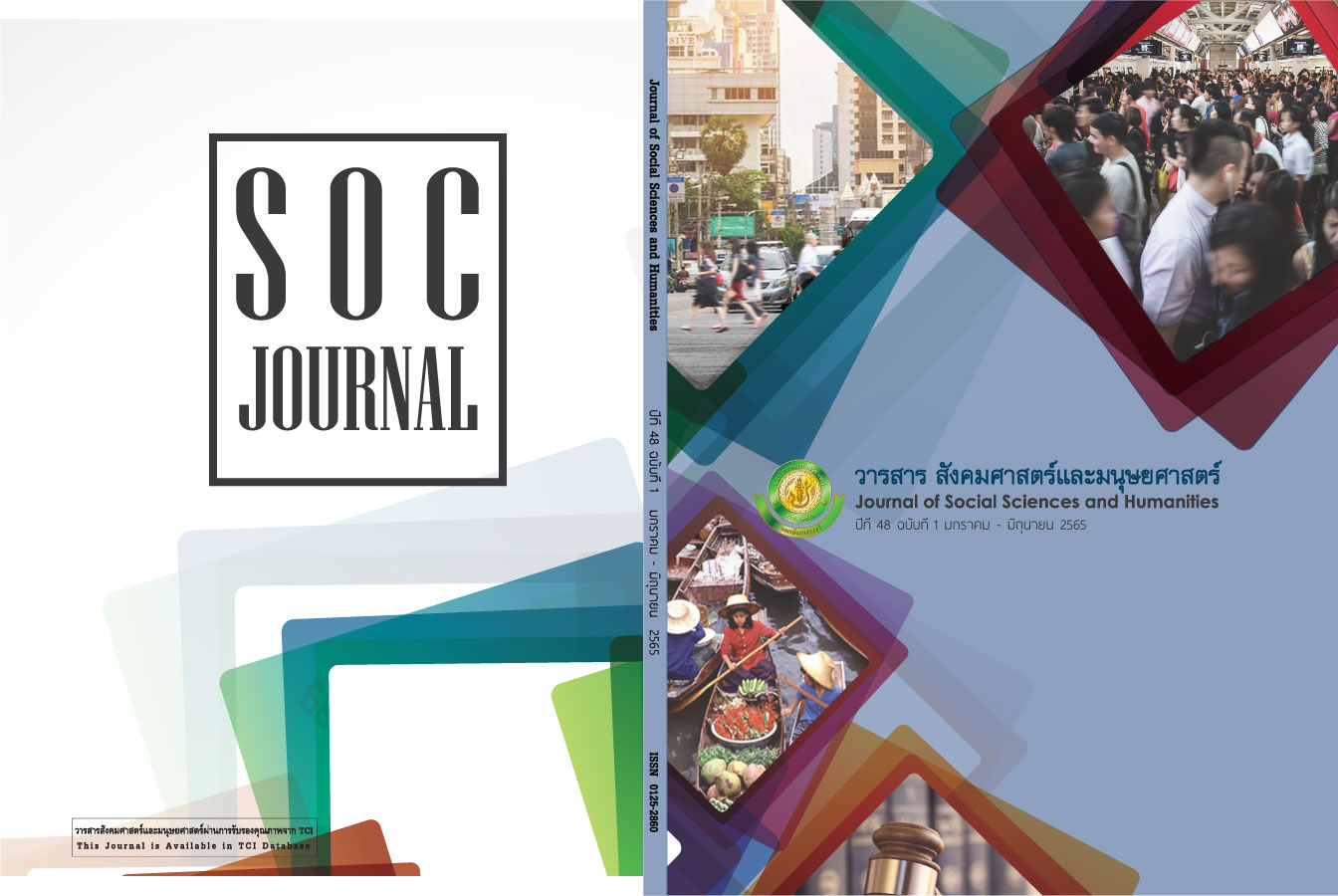อภิบาลโลกด้วยตัวเลข บทบาทของการจัดอันดับและการให้คะแนนใน โลกาภิบาลมาตรฐานการศึกษา
Main Article Content
บทคัดย่อ
บทความชิ้นนี้มีจุดประสงค์เพื่ออธิบายถึงการใช้เครื่องมือทางคณิตศาสตร์ที่เป็นที่นิยมและถูกนำมาใช้ในกระบวนการโลกาภิบาลอย่างแพร่หลายตั้งแต่ช่วงปลายศตวรรษที่ 20 โดยมุ่งศึกษาการจัดอันดับและการให้คะแนนในกระบวนการโลกาภิบาลมาตรฐานการศึกษา โดยเนื้อหาจะประกอบไปด้วยบทนำที่อธิบายถึงความสำคัญของการศึกษาเกี่ยวกับโลกาภิบาลและเครื่องมือที่ถูกนำมาใช้ ส่วนที่สองจะเป็นการอธิบายถึงประเภทของโลกาภิบาลและเครื่องมือในกระบวนการโลกาภิบาลที่มีหลากหลาย ซึ่งสอดคล้องกับเนื้อหาในส่วนต่อไปที่จะเน้นถึงคุณลักษณะเฉพาะของข้อมูลในเชิงคณิตศาสตร์ ในลักษณะของตัวชี้วัด ที่ถูกนำมาใช้ในกระบวนการโลกาภิบาล ในส่วนที่สี่จะเป็นการอธิบายขยายความต่อจากส่วนที่สามโดยใช้โลกาภิบาลมาตรฐานการศึกษาเป็นกรณีศึกษาเพื่อชี้ให้เห็น พัฒนาการของการจัดอันดับและการให้คะแนน ตลอดจนชี้ให้เห็นถึงข้อดีและข้อจำกัดของเครื่องมือเชิงปริมาณดังกล่าว จากนั้นนำข้อดีและข้อจำกัดนั้นมาวิเคราะห์เพื่อสร้างข้อเสนอแนะในการวัดคุณภาพการศึกษาต่อไป
Article Details

อนุญาตภายใต้เงื่อนไข Creative Commons Attribution-NonCommercial-NoDerivatives 4.0 International License.
เอกสารอ้างอิง
สถาบันส่งเสริมการสอนวิทยาศาสตร์และเทคโนโลยี. (ม.ป.ป.). เกี่ยวกับ TIMSS. สืบค้นจาก http://timssthailand.ipst.ac.th/about#:~:text=โครงการศึกษาแนวโน้มการจัดการ, การร่วมกับประเทศสมาชิก.
Allen, R. (2018). The Rise and Rise of Predatory Journals. Retrieved from https://www.universityworldnews.com/post.php?story=20181016093848271.
Bull, H. (1977). The Anarchical Society: A Study of Order in World Politics. New Yok: Palgrave.
Dai, X. (2005). Why Comply: The Domestic Constituency Mechanism. International Organization, 59(2), 363-398.
Davis, K. E., Kingsbury, B., & Merry, S. E. (2012). Introduction: Global Governance by Indicators. In K. E. Davis, A. Fisher, B. Kingsbury, & S. E. Merry (Eds.), Governance by Indicators: Global Power through Quantifications and Rankings. Oxford: Oxford University Press.
Dingwerth, K. (2007). The New Transnationalism: Private Transnational Governance and
its Democratic Legitimacy. Basingstoke: Palgrave Macmillan.
Hansen, H. K., & Muhlen-Schulte, A. (2012). The Power of Numbers in Global Governance. Journal of International Relations and Development, 15, 455-465.
IEA. (n.d.). About US. Retrieved from https://www.iea.nl/about.
Investopedia. (n.d.). Gini Index. Retrieved from https://www.investopedia.com/terms/g/gini-index.asp.
Macháček, V., & Srholec, M. Predatory Publishing in Scopus: Evidence on Cross-Country Differences. Scientometrics, 126, 1897-1921.
Martens, K. (2007). How to Become an Influential Actor - The 'Comparative Turn' in OECD Education Policy. In K. Martens, A. Rusconi, & K. Leuze (Eds.), New Aenas of Education Governance: The Impact of International Organizations and Markets on Educational Policy Making. New York: Palgrave Macmillan.
Morgan, J. (2015). OECD’s AHELO will fail to launch, says education director. Retrieved from https://www.timeshighereducation.com/news/oecds-ahelo-will-fail-launch-says-education-director.
Murphy, C. N., & Yates, J. (2015). Afterword: The Globalizing Governance of International Communications: Market Creation and Voluntary Consensus Standard Setting. Journal of Policy History, 27(3), 550-558.
OECD. (n.d.-a). PISA for Schools - FAQs. Retrieved from https://www.oecd.org/pisa/aboutpisa/pisa-based-test-for-schools-faq.htm.
OECD. (n.d.-b). The Assessment of Higher Education Learning Outcomes. Retrieved from https://www.oecd.org/education/imhe/theassessmentofhighereducationlearning
outcomes.htm.
OECD. (2000). PISA 2000 list of participating countries/economies. Retrieved from https://www.oecd.org/pisa/aboutpisa/pisa2000listofparticipatingcountrieseconomies.htm
OECD. (2019). PISA Participants. Retrieved from https://www.oecd.org/pisa/aboutpisa/
pisa-participants.htm.
O'Neil, C. (2017). Weapons of Math Destruction: How Big Data Increases Inequality and Threatens Democracy. New York: Broadway Books.
QS Top Universities. (2021). QS World University Rankings – Methodology. Retrieved from https://www.topuniversities.com/qs-world-university-rankings/methodology.
Repucci, S., & Slipowitz, A. (2021). Freedom in the World 2021: Democracy Under Siege. Retrieved from https://freedomhouse.org/report/freedom-world/2021/democracy-
under-siege.
Tedx Talks (Producer). (2019). Do university rankings matter? | Hiroshi Ono. Retrieved from https://www.youtube.com/watch?v=Owghne9K1p4.
The National Commission on Excellence in Education. (1983). A Nation at Risk: Imperatives for Educational Reform. Retrieved from https://edreform.com/wp-content/uploads/2013/02/A_Nation_At_Risk_1983.pdf.
THE World University Rankings. (2021). Methodology for Overall and Subject Rankings for THE Times Higher Education World University Rankings 2021. Retrieved from
Transparency International. (n.d.). About. Retrieved from https://www.transparency.org/en/about.
UNESCO. (n.d.). The Report & Education for All (EFA). Retrieved from https://en.unesco.org/gem-report/report-education-all-efa#:~:text=The%20Education%20for%20All%20Development,a%20proxy%20for%20each%20one.
UNESCO. (2000). The Dakar Framework for Action Education for All: Meeting our Collective Commitments. Retrieved from https://sustainabledevelopment.un.org/content/documents/1681Dakar%20Framework%20for%20Action.pdf.
UNESCO. (2012a). The Education for All Development Index. Retrieved from http://
www.unesco.org/new/fileadmin/MULTIMEDIA/HQ/ED/pdf/gmr2012-report-edi.pdf.
UNESCO. (2012b). Youth and Skills: Putting Education to Work. Retrieved from https://unesdoc.unesco.org/ark:/48223/pf0000218003.
World Trade Organization. (n.d.). Understanding The WTO: Settling Disputes. Retrieved from https://www.wto.org/english/thewto_e/whatis_e/tif_e/disp1_e.htm.
Yelland, R., & Valle, R. C. (2013). Towards an international assessment of higher education learning outcomes: the OECD-led AHELO initiative. In P. T. M. Marope, P. J. Wells, & E. Hazelkorn (Eds.), Rankings and Accountability in Higher Education: Uses and Misuses. Paris: UNESCO.


